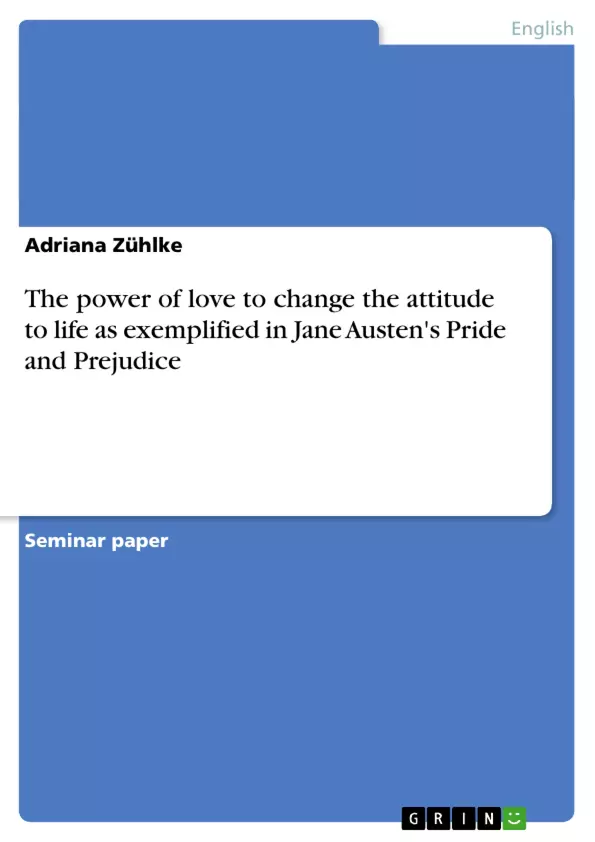Jane Austen’s novel “Pride and Prejudice” was initially titled “First Impressions”, which
already indicates the book’s reference to the weight of appearance and its impact on the
development of relationships, opinions and even a person’s whole life. In fact, the book’s
main action, which focuses on the destiny of Elizabeth Bennet and Mr. Darcy, is based on
first impressions, namely those the characters get at the Meryton assembly. When Darcy
enters the room he is commonly regarded as fine, handsome and in possession of a noble
mien1 – a positive assessment which the party even improves after learning that Darcy is a
wealthy man: “The gentlemen pronounce him to be a fine figure of a man, the ladies declared
he was much handsomer than Mr. Bingley, and he was looked at with great admiration (…)”2.
Nevertheless, soon a certain aversion towards Mr. Darcy develops since he is discovered to be
“the proudest and most disagreeable man in the world”3.
Here, Austen provides a typical example of how the people of her time judged and how “first
impressions” can be influenced by social and economic status. Therefore, the people’s
opinions and perspectives were not likely to be objective but rather collectively biased and
ignorant – one of Austen’s main points of criticism in her comedy of manners. As a
consequence, Elizabeth’s and Darcy’s (re-)actions are influenced by the common etiquette as
well, for the y are both respected members of society and take part in social life with all its
rules and customs.
1 Compare: Austen, Jane: Pride and Prejudice, London: Penguin Popular Classics, 1994, 10
2 Ibid.
3 Austen, 11
Inhaltsverzeichnis (Table of Contents)
- 1.0 The significance and consequences of “first impressions” in the novel
- 2.0 The character of Elizabeth Bennet and Fitzwilliam Darcy and the influence of love on their personalities and attitudes
- 3.0 Conclusion
- 4.0 References
Zielsetzung und Themenschwerpunkte (Objectives and Key Themes)
This essay explores the transformative power of love in Jane Austen's "Pride and Prejudice," specifically focusing on how it challenges the rigid social norms and prejudices prevalent in 19th-century England. It examines the significance of first impressions and their influence on relationships, while delving into the characters of Elizabeth Bennet and Fitzwilliam Darcy and the profound impact love has on their personal development and attitudes.
- The significance of first impressions and their influence on relationships
- The impact of love on personal growth and attitude change
- The role of social class and prejudice in shaping perceptions
- The conflict between individual desires and societal expectations
- The complexities of romantic relationships and the power of self-discovery
Zusammenfassung der Kapitel (Chapter Summaries)
The first chapter delves into the importance of first impressions in shaping the characters' opinions and relationships. Austen's novel, originally titled "First Impressions," highlights how initial judgments, heavily influenced by social standing and wealth, impact the development of romantic entanglements. This chapter focuses on the initial perceptions of Mr. Darcy and the societal bias that colors the characters' views.
Chapter two explores the characters of Elizabeth Bennet and Fitzwilliam Darcy, focusing on their individual personalities and the profound impact love has on their development. Elizabeth's strong-willed nature, intelligence, and independence make her a compelling protagonist, while Darcy's initial pride and social standing create a stark contrast. This chapter examines how their individual growth, driven by love, challenges their ingrained prejudices and societal expectations.
Schlüsselwörter (Keywords)
Key themes and concepts in the text include first impressions, societal expectations, social class, prejudice, love, personal growth, transformation, pride, and the power of individual self-discovery.
Frequently Asked Questions
What is the central theme of the essay on "Pride and Prejudice"?
The essay explores the transformative power of love and how it can change a person's attitude to life, specifically focusing on Elizabeth Bennet and Mr. Darcy.
Why was the novel originally titled "First Impressions"?
The original title highlights the weight of appearance and how initial judgments, often based on social status, impact relationships and opinions.
How is Mr. Darcy initially perceived by society?
He is first seen as a handsome and wealthy man, but soon becomes regarded as the "proudest and most disagreeable man in the world" due to his perceived arrogance.
What role does social class play in the novel?
Social class influences collective bias and ignorance, shaping how characters judge others and creating conflict between individual desires and societal expectations.
How does love affect the characters of Elizabeth and Darcy?
Love drives personal growth and self-discovery, allowing both characters to challenge their ingrained prejudices and change their initial "first impressions."
- Citation du texte
- Adriana Zühlke (Auteur), 2004, The power of love to change the attitude to life as exemplified in Jane Austen's Pride and Prejudice, Munich, GRIN Verlag, https://www.grin.com/document/22771



